Published: Less than 30 min ago
A serious escalation in the threat picture against Taiwan – this is how China’s military exercises with live ammunition are described.
– It is worrying. Undoubtedly, China is pouring gasoline on a fire it believes it can control. But there are always risks, says China expert Niklas Swanström.
China’s major military exercise began the day after US House Speaker Nancy Pelosi visited Taiwan. China had warned that the visit would have serious consequences and the military exercise is seen as a sharp mark from the giant country.
But even if the exercise, which is the largest to date, is seen as a reaction to the top politician’s visit, that is hardly the only reason why it is taking place. It is probably an exercise that the Chinese army – the People’s Liberation Army, which is abbreviated PLA in English – has been planning for a while, says Niklas Swanström, head of the Institute for Security and Development Policy (ISPD).
– This is not something that the PLA throws together over a coffee break just because Pelosi came, but it is clear that there have been plans to carry out this exercise for a longer time, he says.
That China is practicing to take over Taiwan is not new. The threat picture has been serious for a long time. Niklas Swanström believes that China is now taking two steps forward to later perhaps take a step back, but then the pressure on Taiwan has increased nonetheless.
– China can claim that it is backing down for the sake of peace, but in reality it has increased the pressure and increased the crisis for Taiwan over time. This is very much a game for the galleries, he says.
Live ammunition
The fact that China is using live ammunition during the exercise raises concerns in several quarters.
A full-scale war is hardly China’s plan, as it would entail major political and economic consequences, believes Niklas Swanström. But he points out that there is always a risk of mistakes, and he considers the action to be “irresponsible” on the Chinese side.
Niklas Swanström sees the escalation as a development that had probably come sooner or later, but which has now been rushed. And even if China does not choose to start a full-scale war, there are many other things the country can do.
– You can imagine small-scale military operations, taking over, for example, islands. There is a borderland from a full-scale operation to doing nothing, and in that area I think China will be aggressive, he says.
Clearer line
China’s pressure on Taiwan has been increasing for many years but this time the escalation is very rapid. This can cause the international community to react more strongly and have a clearer line on the issue.
The military exercise is condemned internationally, but the question for the international community is not whether Taiwan should be independent or not, but whether this kind of conflict must be resolved by peaceful means.
However, the critical statements from the outside world will hardly affect how China acts towards Taiwan, says Niklas Swanström.
– But you have to condemn this, even if it is perhaps a blow in the air.
– Then it is not up to us to decide whether Taiwan is a country or not, it is up to the Taiwanese to decide.
